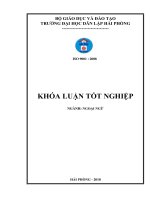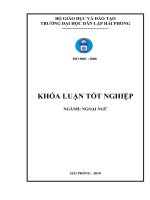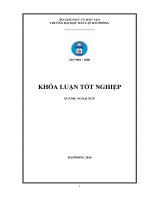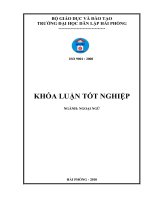A study on translation of procurement terms from English into Vietnamese
Bạn đang xem bản rút gọn của tài liệu. Xem và tải ngay bản đầy đủ của tài liệu tại đây (564.58 KB, 57 trang )
1
Hai phong private university
Department of foreign languages
o0o
ISO 9001:2008
Graduation paper
A study on translation of procurement
terms from English into vietnamese
By:
Nguyễn Thị Hà
Class: NA904
Supervisor:
Phạm Thị Bích Ngọc, M.A
Haiphong - june 2009
2
3
TABLE OF CONTENTS
Acknowledgements
Abbreviations
Tables
Page
Part I: Introduction 1
1. Rationale of the study 1
2. Aims of the study 2
3. Scope of the study 2
4. Methods of the study 3
5. Design of the study 3
Part II: Development 4
Chapter 1: Theoretical background 4
I. Translation theory 4
I.1 Definition of translation 4
I.2 Translation equivalences 7
I.3 Types of equivalence 7
I.4 Translation methods 9
I.4.1 Word-for-word translation 9
I.4.2 Literal translation 9
I.4.3 Faithful translation 10
I.4.4 Semantic translation 10
I.4.5 Free translation 11
I.4.6 Idiomatic translation 11
I.4.7 Communicative translation 12
II. Translation of English for specific purpose (ESP) 12
II.1 Definition of ESP 13
II.2 Types of ESP 14
4
II.3 Definition of English Business 16
II.4 Terms of procurement 17
II.5 The characteristics of procurement terms 18
Chapter 2: Some strategies applied to translate procurement
terms from English into Vietnamese 19
I. The strategy applied in the translation of single terms 19
I.1 General terms 20
I.2 Terms with suffixes “or”, “er”, “ee”, “ant” 23
I.3 Terms with prefixes 25
II. Strategies applied in the translation of compound terms 28
II.1 Automatic shift translation 28
II.1 Rank-shift translation 31
III. Strategies applied in the translation of phrases 32
III.1 Reduction translation 32
III.2 Expansion translation 34
IV Translation of abbreviation by using a loan word 35
IV.1 Acronyms 35
IV.2 Intialisms 36
Chapter 3: Implication 40
I. Some problems in translating procurement terms 40
1. Misunderstandings 40
2. The difficulties in translating some of terms 42
II. Some suggestions in translating procurement terms 43
1. Some steps to translate procurement terms 43
5
2. Suggestion in translating abbreviations 45
Part III. Conclusion 47
References
6
Acknowledgements
In the process of completing this graduation paper, I have faced up with many
problems with lexicology, as well as the way to express my ideas. However,
with the great help, assistance and encouragement from teachers, family and
friends; I have overcome these difficulties and completed this graduation paper
successfully.
First of all, I would like to express my deepest gratitude to Mrs. Pham Thi Bich
Ngoc, M.A and Mrs. Dang Thi Van, M.A, my supervisors who have not only
given me many invaluable suggestions and comments but also provided me with
valuable materials.
Secondly, I am deeply grateful to Mrs. Nguyen Ngoc Lien, M.A – Dean of
Foreign Language Faculty of Hai Phong Private University whose criticism and
advices have improved my study.
In addition, I would like to thank other teachers of Foreign Language
Department for their lessons during 4 years that formed the basis of my study.
Last but not least, my sincere thanks are delivered to my parents and friends for
their encouragement and assistance in this time.
Hai Phong, July 2009
Student
Nguyen Thi Ha
7
Abbreviations
Adj Adjective
EAP English for Academic Purposes
EBE English for Business and Economics
Eg Example
EGBP English for General Business Purpose
ELT English Language Teaching
EOP English for Occupational Purposes
ESBP English for Specific Business Purpose
ESP English for Specific Purposes
ESS English for Social Studies
EST English for Science and Technology
HPU Hai Phong private university
JBIC Japan Bank for International Cooperation
N Noun
SL Source language
ST Source text
TG Target language
TT Target text
V Verb
8
Tables
Page
Table 1: General single terms 23
Table 2: Single terms with suffixes “or”, “er”, “ee”, “ant” 25
Table 3: Single terms with prefixes “in”, “non” 26
Table 4: Single terms with prefix “pre” 27
Table 5: Single terms with prefix “post” 27
Table 6: Single terms with other prefixes 28
Table 7: Compound nouns (Adj+N) 29
Table 8: Compound nouns (N+N) 30
Table 9: Compound nouns (V+N) 30
Table 10: Compound nouns (Participle+N) 31
Table 11: Compound nouns (Adj+Participle) 31
Table 12: Compound adjectives 31
Table 13: Examples about Rank-shift translation strategy 32
Table 14: Examples about Reduction translation strategy 33
Table 15: Examples about Expansion translation strategy 34
Table 16: Acronyms 36
Table 17: Initialisms 38
9
PART I – INTRODUCTION
1. Rationale of the study
In the recent decays, English is more and more widely used as well as gradually
proves itself in all fields in society. Vietnam, in the process of integration and
development, especially after joining in WTO, English is considered as the
golden key make us access to the world‟s civilization. Thanks to translation
texts, we can quickly update technical and scientific achievements, the
international laws, daily news, works of art, literatures, films and conversely,
exchange information, culture and trade to other countries in the world. Hence,
it is affirmed that the work of translation also acts as a bridge not only to
connect people all over the world but also to convey knowledge between
cultures and civilizations in the world.
Translation is a specialist subject for students of foreign language major who
begin studying from the third year with the theoretical background of translation
before translating English for specific purposes. However, the students certainly
face difficulties in the translation process due to not only the variety of
Vietnamese and English words, the differences of using specific English words
but also the more and more appearance of new terms in human activities,
especially terms related to Business English such as security, marketing, real
estate, etc. Now, there is a field also related to Business English is facing to new
challenges in translation of large number new terms. It is called procurement
terms which until now English in this field has not been learned and taught.
Mean while procurement activity gradually becomes popular because our
country has been attracting foreign investors and many international stature
works or equipments under foreign loan or assistance of international loan. We
often meet these terminologies on the advertisement articles of construction,
notices of procurement in article or internet, and procurement laws.
10
From the awareness of the important role of Business English in the age, and
with the knowledge after four years in university, especially after graduation
training period, the researcher determines to choose this field as the graduation
paper to study more on translation skill in English specific purposes and to
improve knowledge about procurement field.
2. Aims of the study.
A linguistician Larson said that: “Good theory is based on information gained
from practice. Good practice is based on carefully worked-out theory…”
(Larson, 1991, p.1). Therefore, the aim of this study is firstly to understand
thoroughly theoretical translation and practice flexibly, creatively and exactly on
specific English.
Secondly, to enrich the knowledge as well as the vocabulary of procurement
terms is also the main purpose of this study. There are many terms with multi-
lexical meaning, used like communication language but have completely new
concepts require translators have knowledge about it.
Thirdly, by personal experience, the researcher gives out some suggested
solutions to readers who pay attention to translation skill and this field.
These mentioned above are main aims of this study.
3. Scopes of the study
In general, procurement is one of the economic activities, includes of many
periods and types and relates to other fields like financial and banking,
technique. Thus, procurement terms are also various and complex. However, all
this terms cannot be presented here because of limited time and knowledge, the
graduation paper focus on words or phrases which are often used in bidding
documents, procurement guidelines under international standard in detail as
follows:
A general view of translation and translation of procurement terms.
11
Translation of usual terminologies in procurement guidelines and
bidding document.
Difficulties in translating procurement terms and some suggested
solutions.
4. Methods of the study
In the process of completing this graduation paper, the researcher used some
helpful sources. All notions and definitions of English terms are collected and
analyzed from procurement law or internet. Add more, the researcher found lots
of useful information in some guideline books for procurement. And all the
illustrated examples are quoted from dictionaries, the guidelines book for
procurement, and from internet. Some teachers and friends as consultants helped
me understand deeply about this area.
5. Design of the study
The study includes three parts in which the second is the most important part, as
hereinafter:
Part one: INTRODUCTION states rationale, aims, scope, methods and design of
the study.
Part two: DEVELOPMENT, consisting of three chapters:
The first chapter is theoretical background with overview of translation
subject, ESP translation and procurement terms.
The second chapter is the study on some strategies applied to translate
procurement terms with detail examples.
The last one is some problems and suggested solutions in translating
procurement terms.
Part three: CONCLUSION summarizes the study mentioned above and gives
some suggestions for further study.
12
PART II – DEVELOPMENT
Chapter 1
Theoretical background
I. Translation theory
Basing on foundation of understanding of how languages work, translation
theory recognizes that different languages encode meaning in differing forms,
yet guides translators to find appropriate ways of preserving meaning, while
using the most appropriate forms of each language.
Hence, this issue will be referred as hereinafter
I.1 Definition of translation
Etymologically, “translation is, a “carrying across” or “bringing across”: the
Latin translatio derives from transferre (trans, “across”+ ferre, “to carry” or “to
bring”)” (Translation, 2005:1).The modern European languages, Romance,
Germanic and Slavic, have generally formed their own equivalent terms for this
concept after the Latin model: after transferre or after the kindred traducere (“to
lead across” or “to bring across”). Additionally, the Greek term for “translation,”
metaphrasis (a “speaking across”), has supplied English with “metaphrase,”
meaning a literal, or word-for-word, translation, as contrasted with “paraphrase”
(a “saying in other words,” from the Greek paraphrasis).
According to Larson, a famous linguistician:
“Translation is a process based on the theory that it is possible to abstract the
meaning of a text from its forms and reproduce that meaning with the very
different forms of a second language. Translation, then, consists of studying the
lexicon, grammatical structure, communication situation, and cultural context of
the source language text, analyzing it in order to determine its meaning, and then









